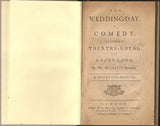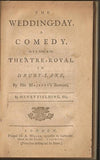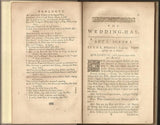The Wedding-Day. A Comedy, As it is Acted at the Theatre-Royal in Drury Lane, by His Majesty's Servants
Author: Fielding, Henry (1707-1754)
Year: 1743
Publisher: Printed for A. Millar
Place: London
Description:
[iii]+82+[2 epilogue] pages. Octavo (8"x 5") bound in modern gray boards and printed paper label. (Cross, page 308; Ximenes Occasional List 92, 108; NCBEL III, 929) First edition. This is the earliest issue, with the price on the title page and earliest press figures. Complete with the epilogue.
Henry Fielding (1707-1754) was a playwright and novelist who figured prominently within the literary and theatrical sphere of Restoration England. Born on April 22, 1707 in Sharpham, England as the oldest of seven children, Fielding received an education in classical languages and literature at Eton College, where he first developed his affinity for writing. Ranging from conventional to experimental forms, his total of 21 published plays received wavering critical responses; his first wild success, The Author's Farce, launched his career as a playwright, whereas The Covent-Garden Tragedy was regarded as one of his biggest flops. Additionally, The Covent-Garden Tragedymarks Fielding's most long-winded dispute with contemporary critics. An innovative satirist and social commentator, he consistently based his works on critiques of contemporary political ideologies, the consumerist fashions of public taste, and the exploitation of writers by playhouses and publishing houses alike. Viewing Fielding as a playwright through the lens of the public eye, focusing specifically on the critical reception and response to his plays leading up to the Licensing Act of 1737, it becomes clear that he was indeed a renowned figure who built his influence gradually throughout his career. Fielding ended his career as a playwright due to the passage of the Licensing Act of 1737, a censorship law to which he himself had contributed due to the increasingly harsh anti-ministerial content of his plays. Indeed, The Historical Register of 1736 served as a catalyst for the act, exposing the potential danger of political satire on the stage. Though Fielding subsequently shifted his career toward novel writing, there is no doubt that his dramatic works greatly influenced and shaped the England of his time. His plays have been adapted throughout history and continue to be performed in modern times, leaving a legacy that endures in the literary and dramatic imagination.
Condition:
First and final leaf dust soiled else a very good copy.













